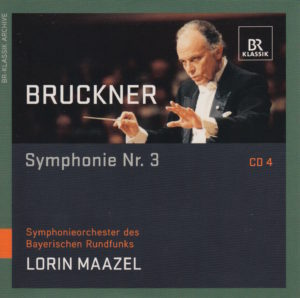 This morning’s conductor of Anton Bruckner’s Symphony No. 3 in D Minor (WAB 103), nicknamed “Wagner,” is American Lorin Maazel (1930-2014), a person about whom I knew nothing and, in fact, of whom I had never heard until I started this project.
This morning’s conductor of Anton Bruckner’s Symphony No. 3 in D Minor (WAB 103), nicknamed “Wagner,” is American Lorin Maazel (1930-2014), a person about whom I knew nothing and, in fact, of whom I had never heard until I started this project.
I encountered Mr. Maazel twice before in this 144-day musical journey: On Day 9, and on Day 25.
To say that Mr. Maazel has not been one of my favorites is to understate the matter.
My wife asked me if it’s hard for me to set aside my previous opinion when I listen to conductors, like Mr. Maazel, with whom I didn’t resonate before.
 My answer is No. It’s not hard.
My answer is No. It’s not hard.
Every day is new. Every conductor and orchestra get the same chance to blow me away, which usually happens (or not) within the first five minutes of the first movement.
In this case, I admit a bit of prejudice in that I expected Mr. Maazel’s interpretation to be long, and I was right. But it’s only the second longest of the eight I’ve heard to date for Symphony No. 3 in D Minor. The distinction of offering up the longest recording so far is Daniel Barenboim, from Day 33, Mr. Barenboim’s interpretation clocked in at 69:18.
So I have to be careful that I do not allow previous experiences to prejudice each current listening.
Before I delve too far into Mr. Maazel’s recording this morning, I need to post the nuts and bolts of what I’m listening to:
Bruckner’s Symphony No. 3 in D Minor, composed in 1873
The version Maazel used is the 1888 version, edited by Nowak
Lorin Maazel conducts
Symphonieorchester des Bayerischen Rundfunks plays
The symphony clocks in at 58:34 (making it the second longest I’ve heard)
This was recorded in January of 1999 in Munich, Germany
Maazel was 72 when he conducted it
Bruckner was 49 when he composed it
This recording was released on the BR Klassic Record Label
Bruckner wrote his symphonies in four parts. The time breakdown of this one (Symphony No. 3 in D Minor, 1889 Nowak version), from this particular conductor (Maazel) and this particular orchestra (Symphonieorchester des Bayerischen Rundfunks) is as follows:
Moderato (Mehr langsam, misterioso, officially)………………………….22:36
Adagio (Bewegt, quasi Andante, officially)…………………………………….15:14
Scherzo…………………………………………………………………………………………….7:03
Finale………………………………………………………………………………………………13:34
Total: 58:34
Okay. Now for the subjective stuff…
My Rating:
Recording quality: 3 (ambient audience/musician sounds from live recording, especially in Movement I)
Overall musicianship: 4
CD liner notes: 4 (short – but interesting – essays on Bruckner, Maazel, and the orchestra, translated into German and English)
How does this make me feel: 3 (meh)
Once again, I am underwhelmed by Maazel’s interpretation.
Not even the Finale, which should have knocked my socks off, seemed tepid, lethargic, to me.
And then there’s the applause at the end, just as there was at the end of the first two symphonies I heard from Maestro Maazel.
I don’t know. There’s something about applause that (a) seems gratuitous, and (b) takes me right out of the recording and makes me realize I’m listening to some conductor and some orchestra somewhere.
There’s something about the overall recording technique, I think, that makes this symphony seem less accessible. The orchestra seems less intimate. It’s like I’m listening to this recording in the audience – from about 20 rows back.
That’s not to say this isn’t clear and crisp and absolutely listenable.
It is to say that I don’t feel like I’m standing in the middle of this orchestra, feeling the music.
Maybe that’s what grips me in the first five minutes onward when I listen to each recording. Maybe it’s a feeling I get that is either there, or is not there. I can hear it immediately.
This is one of those recordings that lacks that subjective feel for me. I don’t feel part of it, involved. So I’m not feeling the emotion from either Bruckner or Maazel and his orchestra.
And maybe that’s not even close to explaining why I’m either shaken and stirred, or I’m not.
All I know is, a recording either grabs me immediately, and engages me to the end, or it doesn’t.
So far, all of Maazel’s recordings do not.
Again, that’s not to say there’s anything wrong with Maazel, or the orchestra, or the recording engineering. It’s just my subjective analysis.
Your mileage may vary.
